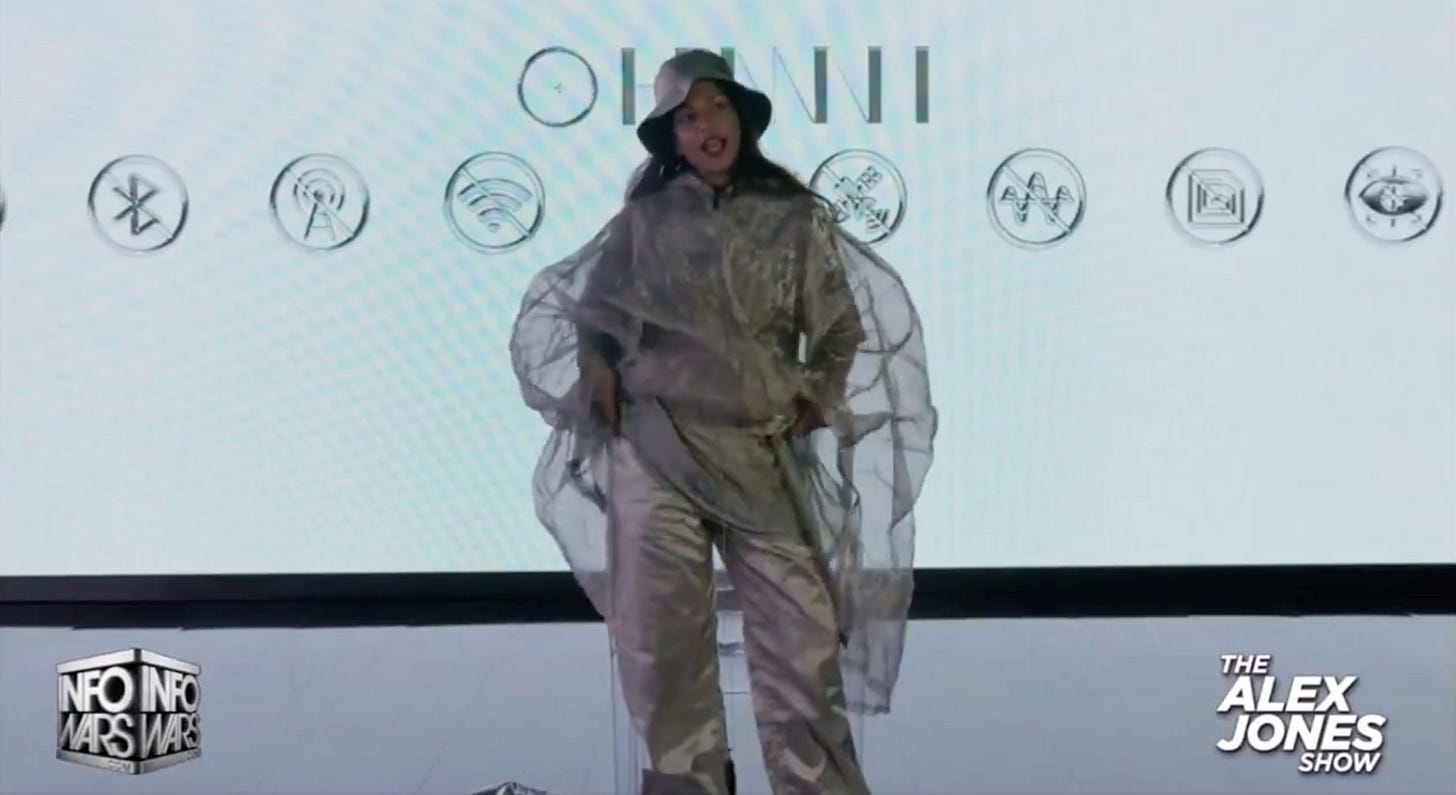Issue 16: M.I.A. vs. NYT
When then singer was interviewed at the height of her career, things went awry.
Recently, I saw that M.I.A., the rapper and musician best known for the song “Paper Planes”, had endorsed Donald Trump for President after being an avid supporter of Robert F. Kennedy Jr. This move didn’t surprise many since, only a couple of months before, she had launched a new clothing line designed to block WiFi, 4G, and 5G from “entering your brain." She introduced the world to this venture on Alex Jones' show. During their meeting of minds, she also talked about her anti-vaxx views and said that “the CIA is obsessed with style and fashion, that’s how they control culture.”
The evolution of M.I.A. (real name Mathangi Arulpragasam) from activist and provocateur pushing against the Sri Lankan government to full-on tinhatter idiot has been a tough one to watch. We're all far too familiar with the process of radicalization these days, whether it's watching your grandparents become paranoid about immigrants because of Fox News poisoning or young men being drawn to the rapey misogyny of Andrew Tate. Nobody is immune to this process, but seeing M.I.A. shift so radically couldn’t help but prove a touch dizzying.
It’s tempting to speculate about what led M.I.A. down this rabbit hole. Is it horseshoe theory in action? Did she see a way to make a quick buck? This is a public figure who was always seen as a divisive firebrand, someone who spoke up and had the spirit if not the know-how to make change. In reviewing her most recent album Mata, critic Robert Christgau said that M.I.A. was "always longer on political instinct than political acuity." She burned bridges but with such style! It also made her a frequent media target, and there’s no more infamous pre-Alex Jones M.I.A. interview than when she sat down with Lynn Hirschberg.
New York Times. "M.I.A.'s Agitprop Pop." May 25, 2010. Lynn Hirschberg.
In 2010, M.I.A. was probably as famous as she would ever be. Two years prior, she had her biggest chart hit with "Paper Planes", which was featured in the Oscar-winning film Slumdog Millionaire. She received an Oscar nomination for her work on that film's soundtrack and was the first person of Asian descent to be nominated for an Oscar and Grammy award in the same year. She performed on-stage at the Grammy Awards while nine months pregnant and have birth to her son soon after.
All of this meant that her next album, Maya (stylised as ΛΛ Λ Y Λ) was hotly anticipated by the mainstream. She'd gone from being an underground artist to a songwriter for Christina Aguilera in less than a decade. Her biggest single for Maya, "Born Free", was immediately controversial thanks to its accompanying music video depicting a world where redheads are the subject of genocide. You either thought it was a startling piece of provocative allegory or a tedious attempt at shock tactics. Really, that’s a good way to sum up M.I.A. – for every fan who loved her willingness to push buttons and attack the status quo, there was another who thought she wore the image of radicalism for clout then shed it whenever she so desired.
One wonders what Lynn Hirschberg’s perspective was on M.I.A. before the pair met. A long-time journalist who is best known today for the Screen Tests series on W Magazine, Hirschberg's Wikipedia page is mostly dominated by her Controversies section. In 1992, she profiled Courtney Love for Vanity Fair and misrepresented a lot of Love's life and medical history at a time when she was pregnant with her daughter. The article caused her child Francis Bean Cobain to be removed from her parents' care by child protection services. Several years later, in a New York Times piece, she claimed that 2Pac had been in a sexual relationship with Faith Evans, the fiancée of the Notorious B.I.G., and that she had given him sexual favours. Evans denies this and says that 2Pac had actually tried to get out of paying her for doing work on one of his tracks unless she had sex with him.
Knowing this before you read the M.I.A. profile, it’s hard to avoid the sense that she came to the table with a desire to knock her subject down a peg or two. The piece opens with M.I.A. talking about getting ready to perform at the Grammys when her contractions hit, then is contrasted with her son being born in a private room at Cedars-Sinai at the insistence of her billionaire fiancé’s family. It's "one of many contradictions that seem to provide the narrative for Maya’s life and art." M.I.A. is the child of Tamil refugees, the daughter of Arul Pragasam, the co-founder of the Eelam Revolutionary Organisation of Students militant group. She’s also a popstar whose then-partner was part of the Bronfman dynasty. There’s long been discourse surrounding whether one can live a wealthy capitalistically fortunate life and still retain their radical roots, but when it comes to M.I.A., Hirschberg seems very pointed in her implicit assertion that she can’t do both.
It's a fair point, of course. There’s nothing revolutionary about being billionaire-adjacent (not unless you’re part of the long game in ensuring you get to eat them first when the war begins.) One of the reasons that celebrity philanthropy and political activism grates on us so much is because we see these people with money and access get mealy-mouthed about important issues then return to their privileged lives without much fuss. It seems as though it’s the rule rather than the exception for these people to bypass walking the walk as they make endorsements or cut ribbons. Before her cultural peak, M.I.A. was frequently lambasted for comments that were viewed as tone-deaf or crossing the line. She had zero filter, which made things tricky when she was talking about stuff as serious as the atrocities committed against the Tamil people of Sri Lanka, a community she is a part of.
As the article notes, M.I.A. allied herself with the Tamil Tigers, who the U.S.A. labelled as a terrorist organization in 1993 following a series of assassinations they took credit for. The Tigers are also known for their use of child soldiers and attacks on their own people, largely women. The Sri Lankan government called her a terrorist sympathizer. Ahilan Kadirgamar at Sri Lanka Democracy Forum is cited by Hirschberg as an expert on the Tigers, saying, “People in exile tend to be more nationalistic. And Maya took a very simplistic explanation of the problems between Sri Lanka’s Sinhalese government and the Tamils. It’s very unfair when you condemn one side of this conflict. The Tigers were killing people, and the government was killing people. It was a brutal war, and M.I.A. had a role in putting the Tigers on the map. She doesn’t seem to know the complexity of what these groups do.”
It's a heavy responsibility to put on any one person's shoulders, especially when they're part of a minority group that most of the world knows nothing about. When you’re the “only one”, or at least the most visible member of a marginalized group, you’re expected to be a perfect spokesperson for everyone, and you will always fail. Adding to that the complicated geopolitical situation of the Tamil people and the Sri Lankan government’s misdeeds, and it’s no surprise that M.I.A. can be so jumbled with her comments. The spirit is there, if not the nitty-gritty. The complications of that, however, mostly serve Hirschberg as further proof of her assertion that M.I.A. is a phony. It’s terrorist chic, in her eyes, a costume she can put on and remove as easily as the Givenchy jewellery she was sent for a photoshoot.
It’s not just M.I.A. who Hirschberg sees as inauthentic, but her largely white fanbase. This feels like sturdier ground for her to make her point on than making a singer seem like a phony because she eats truffle fries. "But many of her fans didn’t listen too closely to her lyrics, concentrating instead on the beat, the newness of the sound and her own multiculti, many-layered appeal," she writes. Certainly, there have been entire theses written on white appropriation and misrepresentation of Black music. I’ve been in clubs when Kanye songs play and a whole load of people saying the N word with their full chests. In the early 2010s, rap was the biggest sound in mainstream music, proving a far more reliable chart topping genre than pop and certainly more than rock.
Hirschberg sees those fans as dabbling in South Asian radicalism and exoticism in the same way they latched onto other musical fads, be it gangster rap or the Macarena. There's an angle here but I think it also overlooks how, for many, M.I.A. is about escapism as much as political fervour. Sure, maybe M.I.A. isn't in the literal trenches of the Tamil cause, but as PopMatters noted, "I don’t think Maya is really a revolutionary anymore than I think Jay-Z was really a big-time drug dealer — it doesn’t matter for my purposes as a listener." M.I.A.'s music was always more ephemeral in its lyrical content anyway, and that's if you can even understand what she's singing (she’s famously a very jumbled performer.)
That's not to say that M.I.A. doesn't occasionally come off as either eagerly contrarian for the sake of it or just a bit daft. She totally does. When she declares, "African design has been killed by Nike [because] Africans no longer want to wear their own designs", you just go, "huh. Then she adds, "The best sportswear is on Blackwater operatives." It's all a bit, "aren't I so subversive" and it's not her strongest suit. She's far more interesting when talking about her instinctive process with making music. But it’s also evident that Hirschberg isn’t a fan of any of it. She describes the “Born Free” video as "exploitative and hollow." She views it as empty posturing not only from M.I.A. and the video's director Romain Gavras, but from Jimmy Iovine, the boss of Interscope, M.I.A.'s record label. Can it really be earnestly provocative if there’s a big-money corporation behind it? Such is the discourse of Art.
When the Times published the profile, the responses were loud. It was labelled as a display of pure cringe from M.I.A., a sign that she had sold out to be a glitzy pop star. She was Bono for the YouTube generation: possibly caring but so self-aggrandizing that nobody could take her seriously. The line about her eating truffle fries was particularly contentious. Apparently, tasty food is a sign of hypocrisy if you care about politics. M.I.A. tweeted "F*ck the New York Times" after the piece came out. People took sides. It got messier when Hirschberg was forced to publish a correction and apologize for reporting quotes out of order.
As the correction says (I’ll quote it all here to avoid a Hirschberg-esque muck-up):
"While discussing her efforts to draw attention to the civil war in her home country, Sri Lanka, she was quoted as saying: “I wasn’t trying to be like Bono. He’s not from Africa — I’m from there. I’m tired of pop stars who say, ‘Give peace a chance.’ I’d rather say, ‘Give war a chance.’ The whole point of going to the Grammys was to say, ‘Hey, 50,000 people are gonna die next month, and here’s your opportunity to help.’ And no one did.” While M.I.A. did make those remarks, she did not make the entire statement at the same point in the interview, or in the order in which it was presented. The part that begins, “The whole point of going to the Grammys,” up to the end of the quotation, actually came first. The part that begins, “I wasn’t trying to be like Bono,” and ends, “Give war a chance,” came later in the same interview. The article should have made clear that the two quotations came from different parts of the interview."
That’s a big honking mistake for a seasoned journalist to make. It’s no wonder many people thought Hirschberg had a bee in her bonnet and went into the profile hoping to knock her subject down. At the very least, it’s the sort of oopsie you wouldn’t expect someone who’s been doing this for decades to make. As far as I can tell, Lynn Hirschberg hasn’t written for the New York Times since.
The piece opened up the floor for the ever-relevant discussion of authenticity versus commodification. Politically minded artists who incorporate their causes into their work will always be accused of performativity and appropriation, mostly because the majority of them suck at it. Angelina Jolie is a prominent exception but how many people can you name who clearly used charity as an excuse to promote themselves? Getting involved in politics is complicated and messy, and as Tina Fey famously declared, authenticity is expensive. We’ve seen how many celebrities who have publicly supported the people of Palestine in the past year have faced industry pushback and accusations of supporting terrorism. Celebs are accused of being hypocritical fakes for using the wrong Instagram filter: imagine what happens when they do something with meaning.
Re-reading this profile for the first time in years was to play a game of Captain Hindsight: Sure, M.I.A. seemed to get a raw deal from her interviewer and her earnestness often exceeded her know-how, but also, you start looking for clues in every quote as to what will lead to her palling around with Alex Jones. Does the messiness around that disconnect between her politics and growing celebrity feel more obvious when you know she’s only a decade or so away from full tinhat conspiracies?
The “crunchy to radicalism” pipeline is a familiar one. There really is no difference in rhetoric between someone who claims vaccines are toxic to your health and those who see them as an act of government mind control. We’ve seen what happens when seemingly progressive people find that their values shift towards those of the hard-right over time, whether it’s Bill Maher’s anti-woke screeds, Tulsi Gabbard going from Bernie bro to conspiracist fave, or Russell Brand cashing in on the YouTube algorithm of hate (Brand also conveniently shifted into the realm of conspiracy and anti-mainstream media ideas when he became toxic in the field for being an accused rapist. Funny timing, eh?) In that context, M.I.A. going from railing against genocide to selling quackery clothing doesn’t seem that unexpected. Putting your foot in it over and over wears thin, and when you’re on the side that expects evolution and accountability, it must be tempting to abandon all of that and embrace those who have no concept of truth.
But it still sucks. It’s awful to watch people be radicalized, and it’s terrifying to see how easily it happens. It takes very little for my YouTube and Instagram recommendations to become flooded with tradwife bullsh*t and anti-medicine rants. There was a period not too long ago where YouTube seemed determined to get me to watch a lot of anti-Meghan Markle videos that were clearly made by racist cranks. Twitter is a cesspool of hate thanks to Elon Musk’s deliberate dismantling of the site to favour lies, slurs, and cruelty. In the midst of writing this piece, I was browsing Instagram and I got videos of RFK Jr. stans talking up his anti-vaxx nonsense (I just wanted to see some Interview with the Vampire fanart, dammit!) I can’t help but pity the likes of her, even when they aggravate me. That doesn’t mean I’m necessarily sympathetic, mind you. I don’t have much patience for celebrities cloistered by their own privilege who use their hatred to make money and further poison an already broken system. Supporting Donald Trump is a very clear line in the sand.
M.I.A. always prided herself on being anti-establishment, even when she was signed to a major record label and engaged to a billionaire's kid. She still claims that label now as she sells "anti-5G" clothing and endorses a real estate heir who gets mad at SNL mocking him. Is she unaware of how exceedingly well-funded and supported by the mainstream all of these “rebels” are? Probably. None of it matters when your own anti-truth grandstanding so smothers you and there’s money to be made. That’s true inauthenticity, not truffle fries.
Thanks for reading. You can find my work scattered across the internet. Over on Pajiba, I wrote about why Chappell Roan’s fans need to leave her alone and the bummer that was the end of the Bennifer marriage. For The Daily Beast, I detailed the horror of MrBeast. For Paste, I looked into the beach read goodness of Elin Hilderbrand. I reviewed Chimp Crazy for TheWrap. I compared the two not-good Exorcist prequels for Inverse.
You can listen to me on the podcast Fatal Attraction. I got to talk about my all-time favourite film, Quills!
On Thursday, I will be flying out to Canada for the Toronto International Film Festival. I’ll be reviewing mostly for Pajiba but will share some tidbits on this newsletter. Are there any movies you’re excited for? What celebrities are you eager to hear about this awards season? Let me know in the comments.
If you’d like to support my work and help fund a few visits to Tim Horton’s, you can donate to my Ko-Fi page!









i remember in 2018 watching the doc about MIA and, although I had not spent any time with her work, finding it so fascinating - there seemed like enough for whole separate docs about her dancing, her fashion choices, her politics, her artistry choices, her early adulthood spent trailing around after Justine Frischmann with this big awkward privilege/wealth/success gap in their friendship… Given how she has been since, I never will revisit it, but I wonder what indications were in there of the turns that have followed
I remember the NYT article well and the vivid, somewhat negative portrait it painted of a complicated person. Didn’t realize it was Lyn Hirschberger. And sad to see M.I.A. drift into upside-down world.